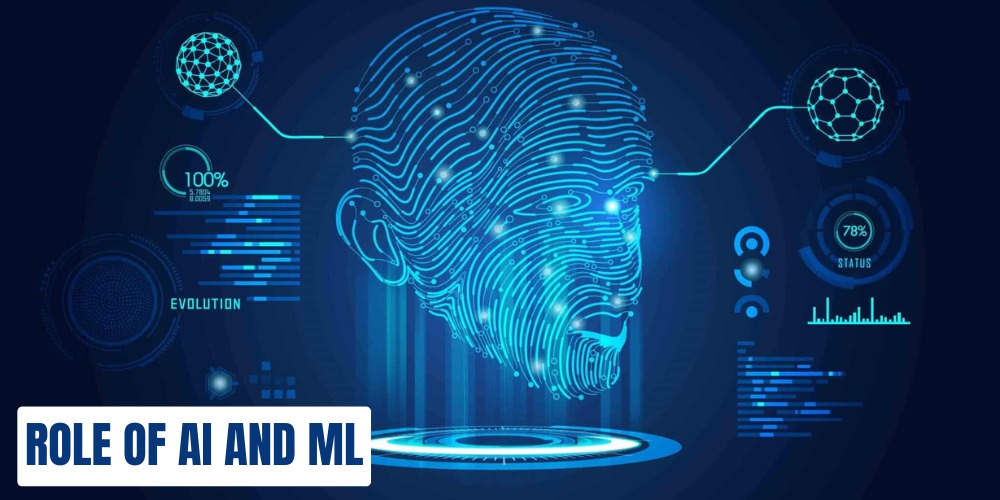-
+91 96679 49121
The Role of AI and Machine Learning in Cloud Computing

Role of AI and ML AI (Artificial Intelligence) and ML (Machine Learning) play a vital role in the advancement of cloud computing, amplifying its potential in several ways. This blog portrays an overview of their roles:
1. Intensifying Automation and Efficiency
AI and ML upgrade automation in cloud computing by enabling systems to learn from data and make intelligent decisions. This reduces the need for manual intervention, simplifying processes such as resource allocation, scaling, and maintenance. For example:
• Auto-scaling: AI/ML systems can predict workloads and adjust cloud resources automatically to meet demand without manual input.
• Load balancing: Exceptional load balancing techniques ensure perfect distribution of traffic and resource usage across various servers.
2. Predictive Analytics
Cloud providers use AI/ML to examine extensive datasets instantaneously, providing businesses with predictive insights. This helps in decision-making, speculating demand, and recognising potential system failures before they arise. Examples include:
• Predicting hardware failures or performance bottlenecks.
• Anticipating customer needs for better inventory management or marketing strategies.
3. Improved Security
AI and ML intensify cloud security by detecting and preventing threats in real-time. Through consistent learning, these systems can recognise anomalous behavior or unauthorized access attempts more effectively than traditional security methods.
• Threat detection and response: ML models can examine network traffic, user behavior, and system activities to flag potential security contraventions.
• Fraud detection: In financial or transactional systems, AI models help detect fraudulent activities.
4. Resource Optimization
AI and ML models help optimize resource usage in the cloud by analyzing workloads and consumption patterns. This ensures that businesses use cloud resources more efficiently, reducing costs and waste. For example:
• Predicting usage trends to optimize storage, computing, and network resources. • Adjusting cloud architecture to minimize idle resources or overprovisioning.
5. Personalized Services
Cloud platforms integrate AI/ML to deliver more personalized user experiences. For instance:
• Recommendations: Machine learning algorithms recommend products or services based on user preferences and behaviors, like in e-commerce platforms.
• Content delivery: AI systems predict and deliver relevant content to users in real-time, based on their usage patterns.
6. Natural Language Processing (NLP) and Virtual Assistants
Cloud providers provide AI-driven resources like chatbots and virtual assistants (e.g., Siri, Google Assistant) powered by NLP and ML. These systems permit users to connect with cloud services more inherently, either through voice commands or text inputs. Businesses use these technologies to amplify customer support and improve operational efficiency.
7. AI and ML as Cloud Services
Cloud computing platforms like AWS, Google Cloud, and Microsoft Azure provide AI/ML tools and structures, making these advanced technologies more accessible to businesses. Some examples include:
• Google Cloud AI: Provides tools for ML, vision, speech, and natural language processing.
• Amazon SageMaker: An organized service for building, training, and installing machine learning models.
• Microsoft Azure AI: Provides a broad range of AI tools for businesses, comprising pre-built models and tools for advancing custom ML solutions.
8. Edge Computing
AI and ML play a vital role in edge computing by operating data closer to the source (e.g., IoT devices) in place of the focussed cloud. This reduces latency and bandwidth costs while enabling real-time processing. For instance, in smart cities, AI models analyze traffic patterns or energy usage locally, only sending essential data to the cloud for further analysis.
9. Improved DevOps and Development
AI and ML smoothen DevOps processes in cloud computing, helping developers automate tasks like code reviews, testing, and deployment. This intensifies the software development lifecycle and diminishes human errors.
• CI/CD (Continuous Integration/Continuous Deployment) optimization: AI models foresee potential deployment issues and suggest solutions.
Conclusion:
AI and ML are transfiguring cloud computing by boosting efficiency, automation, and security, while also permitting advanced analytics and customized services. They make cloud platforms more intelligent and adaptable to the changing needs of businesses, helping organizations stay competitive and reduce operational costs.
Makelink Innovation is always here to help you and provide the best services. For further queries or more details, do contact us via mail at [email protected] or visit our website: https://makelinkit.com/contact-us

